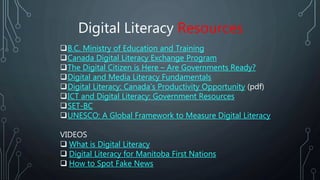Digital + Media Literacy for the Civil Service
- 1. DIGITAL + MEDIA LITERACY FOR THE CIVIL SERVICE PRESENTED BY: GARTH VON BUCHHOLZ, BA, CUA
- 2. DIGITAL + MEDIA LITERACY Have you ever considered all the digital elements in your life that you sometimes have to struggle to understand? ? New apps you’ve never used before ? Familiar apps that change their interface ? Digital devices such as new cellphones, TVs or cameras that are entirely different than your last ones ? Websites that don’t work properly or have confusing information ? Electronic forms that fail ? Helping family or friends who have issues with technology ? Difficulties with editing or sharing photos and videos ? Dealing with privacy issues, misinformation, stalkers, trolls, phishers and spammers on social media
- 3. DIGITAL + MEDIA LITERACY What is one of your biggest challenges with digital living? How would you define being “digitally literate”? Select the Chat icon at the top of your screen to open the chat window, then type in your feedback on these questions!
- 4. DIGITAL + MEDIA LITERACY What is Digital Literacy? Digital literacy is a sets of technical skills or competencies that can be learned and evaluated. These skills help people navigate their digital environments successfully and become creators as well as consumers of information.
- 5. DIGITAL + MEDIA LITERACY Digital Literacy in Canada The Government of Canada funds a Digital Literacy Exchange Program to help support Canadians who may be most impacted by a lack of skills and a lack of access to the Internet and technology in general (see video on digital literacy initiatives for Manitoba First Nations). “Innovation and technological progress is creating tremendous change, and as a result, digital skills are increasingly relevant—in school, at home and in the workplace. This is true for Canadians of every age, background, education level and employment status. While 83% of Canadians use the internet (Canadian Internet Use Survey 2012), there are still groups who are newly involved with, or haven't fully discovered the benefits of being online. It is important to support these groups to ensure no one is left behind in the digital economy.”
- 6. DIGITAL + MEDIA LITERACY Digital Literacy in B.C. In British Columbia, we have a definition of Digital Literacy based on standards developed by the International Society for Technology in Education. The B.C. Ministry of Education defines digital literacy by these characteristics: 1. Research and information literacy 2. Critical thinking, problem solving and decision making 3. Creativity and innovation 4. Digital citizenship 5. Communication and collaboration 6. Technology operations and concepts
- 7. DIGITAL + MEDIA LITERACY Why is Digital Literacy important for civil servants? ? We are information consumers and need to understand our digital environments and the information around us so we can effectively help ourselves and our colleagues ? We need to learn how to use information and communication technology to effectively deliver information and services to the citizens we serve ? We need to be aware of the challenges in improving our digital literacy and overcoming accessibility barriers that affect different people in different ways (intersectionality and GBA+) ? We need to be aware of the potential risks and failures of digital services and communications so we can prepare and resolve them when they occur
- 8. DIGITAL + MEDIA LITERACY Related Digital Literacy concepts…
- 9. DIGITAL + MEDIA LITERACY What is Media Literacy? Digital Literacy means we have the skills to be both producers of digital content as well as consumers of it. Media Literacy is one aspect of how critical thinking skills, technical skills and social skills can help us online.
- 10. DIGITAL + MEDIA LITERACY Oct 26-30 this year was annual Media Literacy Week in Canada (https://mediasmarts.ca/me dia-literacy-week), an annual event that has also been adopted in the U.S. by the National Association for Media Literacy Education (NAMLE) https://mediasmarts.ca/media-literacy-week
- 11. DIGITAL + MEDIA LITERACY What is Digital Citizenship? Source: MediaSmarts.ca Source: TeachThought.com Digital Citizenship is…how we interact safely, ethically and responsibly in our digital environments
- 12. DIGITAL + MEDIA LITERACY What is Digital Citizenship? Source: MediaSmarts.ca “Digital Citizenship is the norms of behaviour with regard to technology use. It involves: having access to technology, being willing and able to use technology fairly, proficiently, and responsibly. The concept of digital citizenship is complex and multi-faceted.” Source: Special Education Technology – British Columbia (SET-BC)
- 13. DIGITAL + MEDIA LITERACY Digital Literacy benefits everyone… Source: MediaSmarts.ca ? Helps make government services more accessible and to consider Gender-Based Analysis+ factors ? Helps civil servants become better information and service creators ? Helps improve commerce and drive the digital economy ? Helps civil servants become smarter stewards of information, more responsible digital citizens ? Ensures the civil service is capable of meeting technology challenges and reducing risks associated with them
- 14. DIGITAL + MEDIA LITERACY Now that we know more about Digital+ Media Literacy skills and why they are important… What do you think we can do to promote Digital Literacy in Canada? How do you think we can become better Digital Citizens, in our work and in our everyday lives? DISCUSSION POINTS
- 15. Digital Literacy Resources ?B.C. Ministry of Education and Training ?Canada Digital Literacy Exchange Program ?The Digital Citizen is Here – Are Governments Ready? ?Digital and Media Literacy Fundamentals ?Digital Literacy: Canada’s Productivity Opportunity (pdf) ?ICT and Digital Literacy: Government Resources ?SET-BC ?UNESCO: A Global Framework to Measure Digital Literacy VIDEOS ? What is Digital Literacy ? Digital Literacy for Manitoba First Nations ? How to Spot Fake News















